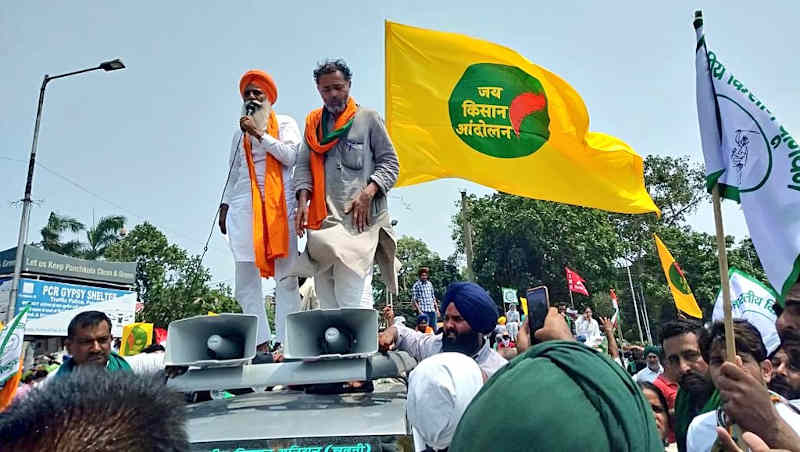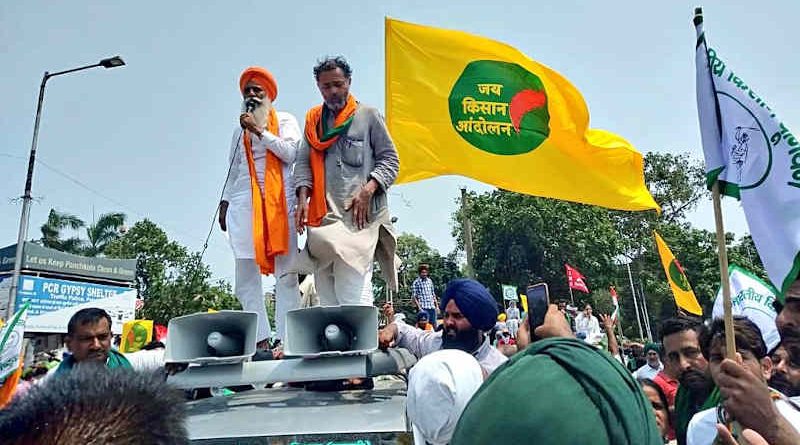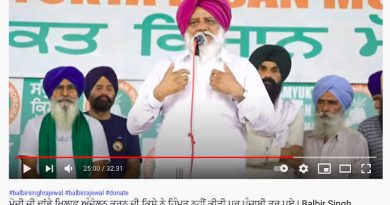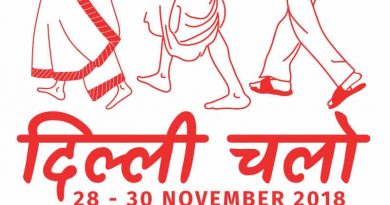Why Protesting Farmers Must Explore Political Options to Win the Battle

Why Protesting Farmers Must Explore Political Options to Win the Battle
The unconditional obedience of the farmers gives the impression that their movement is not a protest against the government, but it is a collaboration with the Modi regime which is imposing the laws that farmers oppose.
By Rakesh Raman
After eight months of unsuccessful struggle to get the contentious farm laws repealed, the protesting Indian farmers should have realized that they are fighting a losing battle. However, they feel offended if you tell them that their agitation has lost steam in terms of its clout, content, and curiosity, as the government headed by prime minister Narendra Modi has simply ignored their screams.
In order to hide their defeat, the farm leaders from the Sanyukt Kisan Morcha (SKM) – the umbrella organization of nearly 40 protesting farm unions – start counting their irrelevant efforts such as the duration of the agitation, global support, general awareness, and so on.
But these were never the objectives of the protest. The farmers had started the protest to get three farm laws on contract farming, sales of crops through private marketplaces (mandis), and storage of produce canceled. They are also demanding the legal guarantee of minimum support price (MSP) for their crops.
The protest that began in November 2020 on the outskirts of Delhi has now entered Delhi, as a handful of farmers are holding a ‘Kisan Sansad‘ (farmers’ parliament) at the traditional protest site Jantar Mantar.
Although the so-called Kisan Sansad was planned to be held in front of the Indian Parliament, the Delhi Police – owned and operated by the Modi government – did not allow farmers to go near the Parliament.
As usual, the obedient farmers followed the police diktat to stay away from the Parliament where the monsoon session is in progress. Earlier, in January also, the Delhi Police had dictated the route that farmers were forced to follow in the city for their tractor march.
Instead of insisting on their own movement plans, the pliant farmers easily succumb to the government orders. The unconditional obedience of the farmers gives the impression that their movement is not a protest against the government, but it is a collaboration with the Modi regime which is imposing the laws that farmers oppose. Paradoxical, but true.
The indifference of the Modi government toward farmers can be assessed from the fact that it has not called farmers for talks during the past over six months. Now just a few hundred farmers – mainly from Punjab – are gathering in random rallies which are utterly meaningless. Similarly, a few farmers are sitting idly on Delhi borders – with no impact of their presence on the Modi government.
Although a few cunning farm leaders repeatedly claim that the foreign governments are supporting their demand of repealing the laws, no foreign leader ever made such an assertion.
Initially, Canadian PM Justin Trudeau, British Labour Party MP Tanmanjeet Singh Dhesi, U.S. Senators Bob Menendez and Chuck Schumer, and the Office of the United Nations High Commissioner for Human Rights issued some routine statements.
But these statements were not about the merits or demerits of the farm laws. Rather, they urged the Modi government to allow farmers to hold peaceful protests. Since the farm leaders have failed in their protest and have nothing to boast about, they are falsely claiming in front of the gullible protesters that foreign leaders are supporting their demands.
FROM PROTEST TO POLITICS
After this visible failure, these farmers have hardly any options. They can’t openly admit that they have lost the battle because of their own naivety and acquiescence. They can’t expect support from the political outfits because all of them are virtually extinct. They do not have skills to raise their farming issues at the international forums. The Modi government has flatly refused to accept farmers’ demands.
So, for all practical purposes, the farm agitation is dead. If farmers still want to oppose the Modi government and its policies, they will have to reposition their agitation. In June, the farmers had decided to expand the scope of their protest with the slogan ‘Save Farming, Save Democracy’. They need to build their future struggle around this slogan, which has a built-in flavour of politics in it.
To begin with, they need to structure their agitation around overall agricultural reforms and keep other burning issues such as political criminality, corruption, human rights abuses, inflation, and joblessness in India as their other focus areas.
The political initiative of the Indian farmers will be similar to the first modern Farmer–Labor Party that was formed in Minnesota, U.S. in 1918. The socio-economic distress forced farmers and workers to enter the political sphere so that their grievances could be addressed.
Indian farmers can also learn from other farmers’ movements in the world that evolved to become political initiatives. For example, the Populist Party emerged out of the Farmers’ Alliances and the agricultural distress of the 1880s in the U.S.
Indian farmers must realize that they can’t get full relief without full democracy in India. Even if the government repeals these laws, they will keep emerging again in some other form, as the government is hell-bent to persist with its autocratic tendencies.
In the next phase, after a few weeks, the farmers must mobilize human support to announce their political plans to enter electoral politics. Some farm leaders have already started propagating this political alternative vociferously with the advice to begin the political journey from Punjab where the Assembly election is scheduled to take place in 2022.
It will be an uphill task for the farm leaders to embark upon this venture because in their present group there is no leader who is wise enough to handle this political project. So far, with their raw rhetoric and slow sloganeering, these leaders have been working in an unorganized and ad hoc manner and they lack skills to work in a professional environment.
They will have to rope in new talent to win the political battle and form their government in Punjab where most people are fed up with the traditional political parties such as Congress, Aam Aadmi Party (AAP), Bharatiya Janata Party (BJP), and Shiromani Akali Dal (SAD). Farmers can hope to win.
Subsequently, they should set their eyes on the 2024 Lok Sabha election. There are an estimated 140 million (14 crore) farmer families in India with a vote count of nearly 400 million (40 crore). With this strength, if farmers could handle their political campaign professionally, they can easily win most state elections as well as the national election. Then they don’t have to worry about the farm laws against which they are fighting now.
At this stage, the farmers need a selfless leader who can position the ongoing struggle accurately to achieve this political objective.
By Rakesh Raman, who is a national award-winning journalist and social activist. He is the founder of a humanitarian organization RMN Foundation which is working in diverse areas to help the disadvantaged and distressed people in the society.




